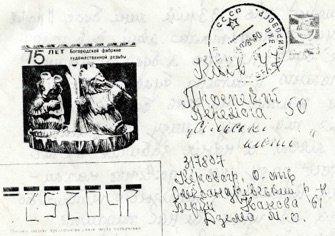












Full Name in Ukrainian: Марія Дзема, M.O. Дзема
Full Name in English: Maria Dzema
Data of Birth: 1922
Place of Birth: Birky
Raion: Oleksandrivka raion (now Kropyvnytsky raion)
Oblast: Dnipropetrovsk oblast (now Kirovohrad oblast)
Country: Ukraine
Copy of original: Yes
Envelope: Yes
Number of pages: 6
Keywords: Ukraine--History--Famine, 1932-1933--Personal narratives; Famines--Ukraine--History--Sources; Famine victims; Holodomor; Голодомор; child; survival strategies; food substitution; cow; theft; barter; travel outside Ukraine; eviction; dekulakization; violence; vigilantism; search brigades; perpetrators.
Notes:



Maria Dzema describes events in the village of Birky, Oleksandriia raion, Dnipropetrovsk oblast (currently village of Birky, Kropyvnytsky raion, Kirovohrad oblast) and nearby locations during the Holodomor.
Maria was 11 at the time of the Famine. She was the eldest of five children.
Maria Dzema describes how their family survived the Famine. Her father was hiding three small bags of rye in the forest. He took those bags in only at night, until the search brigade found and took them away. Then the family made pancakes from the linden leaves which they had with milk from their own cow. Dzema’s father also travelled to the Caucasus to trade her mother’s shawls and jackets for two poods (approximately 33 kg) of corn.
Maria also recalls helping a neighbor, Nastia Shurpykha to bury her son and then witnessing her lying dead in her home covered in lice.
Maria’s uncle was dekulakized and evicted from his house with his large family with eigh children. They barely survived the Famine. It helped that the uncle was a skilled mechanic fixing mills for collective farms.
She also recalls a horrific case of vigilante justice. A young couple was trying to sell gold earrings for a bowl of corn, but no one was interested in buying gold earrings. The couple ended up stealing and killing a cow, but they were caught, tortured, beaten and left for dead in the forest. Maria believes that torturing them was wrong because they stole the cow out of despair. Maria also criticizes those who say that the actions of the activists of search brigades served some higher purpose. She believes that their actions were self-serving. She names one such activist in their village, Yavdokha Kaplovukha.
SYNOPSIS

The UCRDC depends on voluntary donations – both individual and institutional - for its financing.
It provides receipts for tax purposes.
-
‣Home



